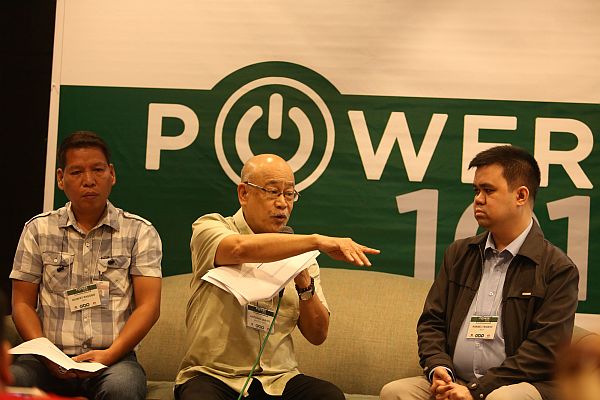
Antonio Labios, Department of Energy Visayas field office director (center), discusses plans to streamline the processing of approval of documents of big-ticket power projects during a forum in Cebu City.
CDN PHOTO/LITO TECSON
Hoping to attract more investors for big-ticket power projects, the energy department plans to adopt streamlined approval processes for faster implementation of these projects and eventually address the growing power demand in the country especially in the next 20 years.
Antonio Labios, Department of Energy (DOE) Visayas field office director, said this would be made possible through the Energy Investments Coordinating Council (EICC) created after President Rodrigo Duterte signed Executive Order No. 30 last June 28.
“The EICC seeks to streamline regulatory procedures affecting energy projects as we aim for energy security amid robust economic development,” he said during a Power 101 forum for media at the City Sports Club Cebu on Tuesday.
Labios explained that the EICC is tasked to, among others, classify energy projects of “national significance” (EPNS) and simplify the procedures in securing permits from various government agencies required to start an energy project.
The director added that to qualify as an EPNS, a project must cost at least P3.5 billion and should have a significant contribution to the country’s development, economy, and environment, among others.
He said this move was necessary to ensure the effective and timely implementation of energy projects identified in the Philippine Energy Plan (PEP) 2017-2040.
The energy department said the country’s power demand is expected to grow as fast as the economy, in that every one-percent growth in the national gross domestic product also signifies a one-percent growth in the demand for power.
The DOE projected that the Philippines would need an additional 43,765 Megawatts of power by 2040 to meet the peak demand of more than 40,000 MW.
Meanwhile, the Visayas will need 9,180 MW to meet the 9,210 MW peak demand by 2040.
Labios said following the EICC’s meeting last August, the body is set to convene once more in November to finalize the Implementing Rules and Regulations (IRR) of its mandate.
By then, he said the agency can already start determining which undertakings can be considered as EPNS.
Senator Sherwin Gatchalian, chairman of the Senate committee on energy, said in earlier reports that it took investors 1,340 days, 358 signatures, and 74 agencies to secure permits for the construction of energy projects.
Labios said he cannot specify the extent to which this process will be reduced through the new order, but assured investors of improvements once it will be fully implemented.
He said projects classified as EPNS will be approved by acting agencies with the presumption that other agencies have already given their go signal for it.
These agencies, Labios added, should also act on the applications not more than 30 days after the completion of documentary requirements.
As of August 2017, the DOE has recorded 408 MW in total committed projects in the Visayas, which were seen to bring significant improvements to the grid between 2018 and 2019.
Labios said that while some of these may have qualified as EPNS, these are no longer eligible since these have already been approved earlier.
Jaime Azurin, Global Business Power Corp. president, said he hopes the DOE will be successful in the implementation of the 30-day approval policy among government agencies handling energy projects.
“Challenges in the energy sector are intertwined. All stakeholders must join forces to address these many challenges,” he said.
One of the challenges he cited was how the power sector can keep up with the robust expansion of the Philippine economy, which grew by 6.5 percent in the second quarter of 2017, only behind China but ahead of all its neighbors in the Asean region.
“We need to capitalize on this sustained momentum. As economic growth continues, so should progress in the power industry,” Azurin said.

